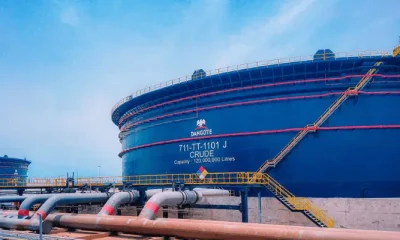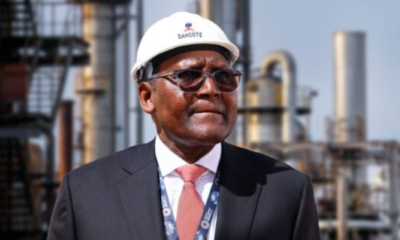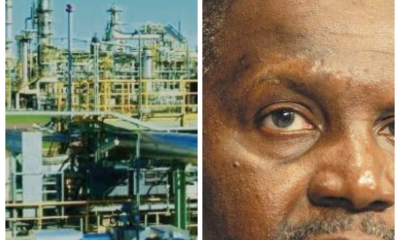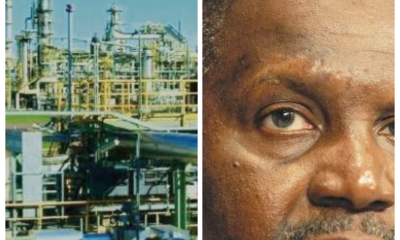Economy
REPS CALL FOR SUSPENSION OF NMDPRA BOSS OVER ALLEGATIONS AGAINST DANGOTE REFINERY

REPS CALL FOR SUSPENSION OF NMDPRA BOSS OVER ALLEGATIONS AGAINST DANGOTE REFINERY
By Tobouke JEMINE
The House of Representatives has called for the suspension of Farouk Ahmed, CEO of the Nigerian Midstream and Downstream Petroleum Regulatory Authority (NMDPRA), pending an investigation into his statements about Dangote Refinery.
This decision follows a motion by Esosa Iyawe, representing Esosa Federal Constituency, Edo State. Iyawe highlighted concerns over fuel quality in the Nigerian market, emphasizing the impact of high sulphur content on engines and pollution.
Contrary to Farouk’s claims that Dangote’s diesel is inferior with high sulphur content, tests showed Dangote’s diesel has significantly lower sulphur levels compared to imported diesel.
Lawmakers criticized Farouk’s statements and are investigating his allegations and the presence of middlemen in crude trading.
Economy
ALIKO DANGOTE IS A TITAN THAT GOD CREATED SPECIALLY FOR MANKIND – FEMI OTEDOLA
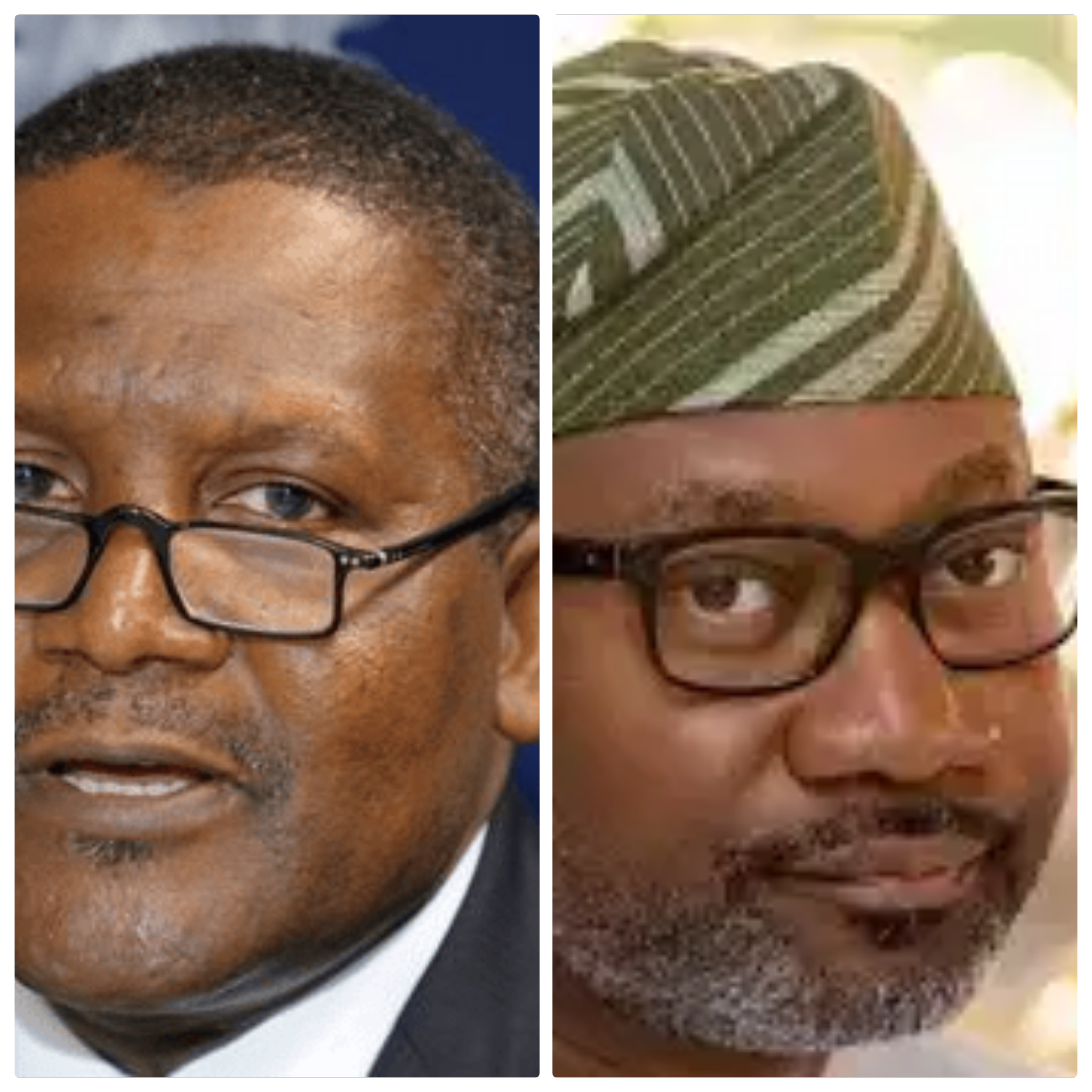
ALIKO DANGOTE IS A TITAN THAT GOD CREATED SPECIALLY FOR MANKIND – FEMI OTEDOLA
By Tobouke JEMINE
Following the recent dispute between the Dangote Refinery and some regulatory agencies, the Nigerian business mogul , philanthropist, former chairman of Forte Oil PLC, and current executive chairman of Geregu Power PLC, has punched in in defence of Aliko Dangote.
Read his reaction below:
My brother, the Visionary, has built the largest single train refinery in the world, not in Kano, but in Lagos State. He is the owner of the second-largest sugar refinery in the world, also in Lagos State, and the largest cement factory in the world, not in Kano, but in Kogi State.
Additionally, he has established one of the second-largest fertilizer plants in the world, soon to surpass the biggest one in Qatar, also in Lagos State. Furthermore, he has built a fertilizer plant in Lagos that already exports globally. Aliko Dangote is a titan that God created specially for mankind.
Aliko Dangote is also the largest private sector employer of labor in the country, and his companies are among the largest taxpayers. In fact, the Dangote Group often pays more in taxes than the top banks combined.
If not for him, we would still be importing cement. His contributions extend beyond industrial facilities to critical infrastructure, having built major roads such as the Apapa Oshodi-Owonrosoki Express Road, Wharf Road, and the Obajana-Kabba Road.
Countries in the nascent stages of industrialization require visionary leaders. This is why it’s no surprise that the United States was built by the vision and tenacity of a few remarkable individuals—Cornelius Vanderbilt, John D. Rockefeller, Andrew Carnegie, J.P. Morgan, and Henry Ford—THE MEN WHO BUILT America’s industrial landscape.
These men left the world without these assets but left behind a legacy that has kept their country thriving generation after generation. Their contributions were immortalized not in the material wealth they amassed but in the enduring institutions and industries they established. These visionaries were also supported by their government, which recognized the importance of fostering local champions.
Similarly, today’s tech giants like Microsoft and Tesla received substantial support from the US government. For example, in January 2010, the Department of Energy issued a $465 million loan to Tesla Motors to produce specially designed, all-electric plug-in vehicles and to develop a manufacturing facility in Fremont, California to produce battery packs, electric motors, and other powertrain components for powering these innovative vehicles. This initiative is part of broader efforts, such as the federal EV-charging program supported by the infrastructure law known as the National Electric Vehicle Infrastructure program, or NEVI.
In India, the government has been instrumental in supporting business titans like Gautam Adani and Mukesh Ambani. Their companies have received significant backing to grow and expand, contributing substantially to India’s economic growth and global business footprint.
There are also records of emerging market countries like Vietnam, South Africa, Brazil, and China where their governments have supported local businesses to jump-start industrialization. In Vietnam, the government has provided various incentives to tech companies, fostering a rapidly growing technology sector.
In South Africa, government support for the mining industry has been crucial in maintaining its global competitiveness. Brazil has seen substantial government investment in its agricultural sector, transforming it into one of the world’s leading food exporters. In China, government backing for companies like Huawei and Alibaba has propelled them to global leadership in technology and e-commerce.
In Nigeria, we have our own titans, and it is imperative that we recognize and support them. Aliko Dangote has broken every boundary in worldwide business and industry. His contributions are not just a testament to his brilliance but a beacon of what is possible when vision meets opportunity. Supporting local champions like Dangote is crucial for our national development and economic independence. Let us continue to foster and support these visionaries who drive our nation’s progress…
Economy
CBN TO BANKS: Transfer Funds in Dormant Accounts/ Unclaimed Balances to Us
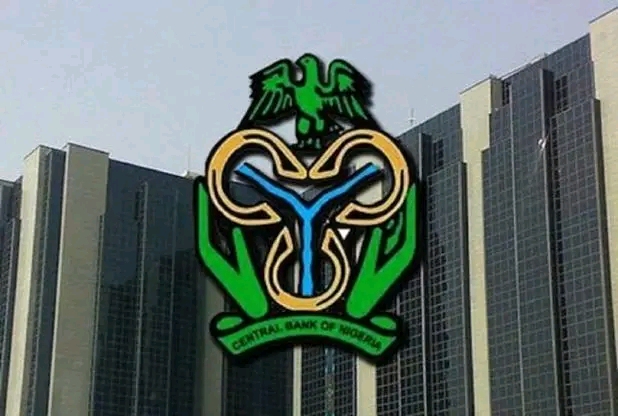
IduwiniVoice
By Tobouke JEMINE
The Central Bank of Nigeria (CBN) has directed all banks and other financial institutions to transfer funds in all dormant accounts to the apex bank.
A circular issued by CBN Ag. Director of Financial Policy and Regulations, Mr. John Onoja, yester night revealed that accounts that have remained untouched for 10 years and above would be affected.
It said, “The provisions of this guideline shall apply to all financial institutions under the purview of the Central Bank of Nigeria.”
According to the circular, the objectives of this move, among others, were to identify unclaimed balances in dormant accounts, and financial assets with a aim to reuniting them with their beneficial owners; keep the funds in trust for the beneficial owners; standardize the management of dormant accounts and unclaimed balances, and financial assets; establish a standard procedure for reclaiming warehoused funds.
It added, “Eligible accounts are dormant account balances that have remained with the FIs for a period of ten (10) years and beyond.
“Eligible dormant accounts/unclaimed balances and other financial assets shall include: current, savings, and term deposits in local currency; Domiciliary accounts; deposits towards the purchase of shares and mutual investments; and prepaid card accounts and wallets.
“Government Owned Accounts; Proceeds of uncleared and unpresented financial instruments belonging to customers or non-customers of FIs; Unclaimed salaries and wages, commissions, and bonuses; Proceeds of stale local and/or foreign currency drafts not presented for payment by beneficiaries; Funds received from a correspondent bank without sufficient details as to the rightful beneficiary and/or a recall of funds made to the remitting bank to which the Nigerian bank account had not been debited.
“A judgment debt for which the judgment creditor has not claimed the amount of judgment award; and any other deposits or financial assets that may be designated by CBN.”
According to the CBN, the following classes of dormant accounts/financial assets are exempted: Accounts that are subject of litigation; A judgment debt for which the judgment creditor has not claimed the amount of judgment award and the case is still active in court; Accounts under investigation by a regulatory authority or law enforcement agency; and encumbered accounts, including, but not limited to, collateral and loans.
© Source: 2024 Vanguard Media Limited, Nigeria
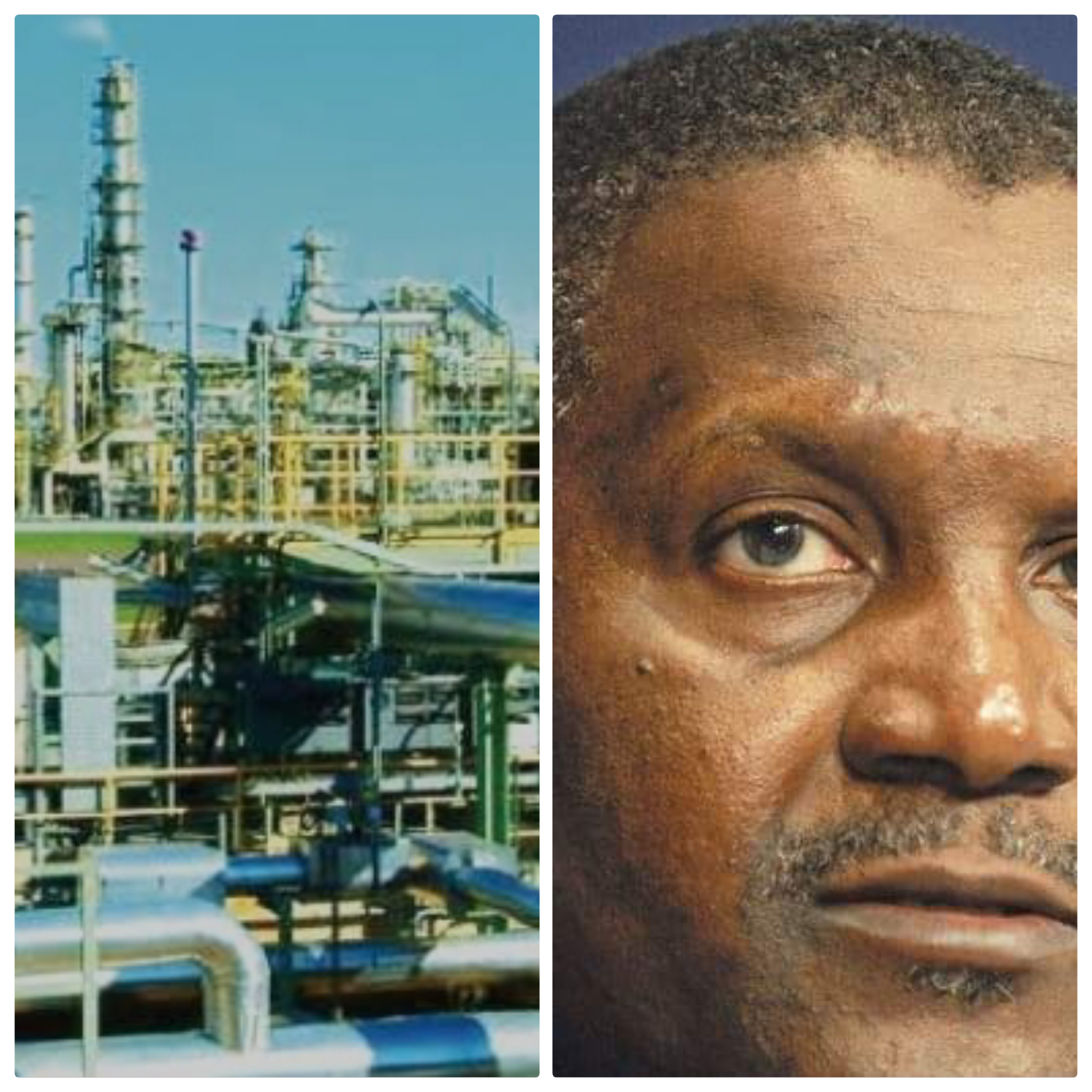
IduwiniVoice
DANGOTE: If we knew the magnitude of what we were going into, we would have . . .
•Speaks on the construction of a refinery Nigeria banks on for economic revival, his frustrations, achievements, expectations
•It’s like swimming in the middle of the sea, getting tired but making efforts to swim out lest you drown
By Onochie Anibeze
Three places have been etched as outstanding experiences for me over my years as a journalist.
One was in St. Peter’s Basilica and some ancient churches I visited in Rome while touring Europe with the Eagles in preparation for the USA ’94 World Cup finals.
The Basilica is 452 feet high. Its dome is the highest in the world. As tall as it is, the church sits on the tomb of St. Peter, one of the apostles of Jesus Christ. But the wonder to me is the use and the design of marble and tiles up to the last foot. There were no cranes when that church was built. How workers were able to brave the physical challenges to construct such an architectural masterpiece is a striking question.
The second place of wonder to me is in Egypt, the Pyramids. Everybody knows about the Pyramids but note this. The height of each pyramid (there are about seven of them) is about 139 metres and the average weight of a stone used in building them is 2.5 tons. The largest granite stones weigh 25 to 80 tons each. Now the wonder. These pyramids are in the desert. They were built between 2700 B.C. And 1500 B.C.
How did they move those large stones to the desert? How did they mount them one after the other to that height at the time when there were no cranes? You need to visit the Pyramids to appreciate why it is one of the wonders of the world.
Interestingly, a third wonder that I have just seen is not far from where I work in Lagos, Nigeria. It is the Dangote Petroleum Refinery at Ibeju Lekki in Lagos.
President of the Dangote Group, Alhaji Aliko Dangote led a large team of media and businessmen on a tour of the refinery last Sunday. A lot has been written and said about the engineering marvel. President of the Guild of Editors, Eze Anaba simply described it as ‘monstrous’.
I don’t know how to start capturing our tour last Sunday. But you may understand better when told that a tour we started at about 7.30 am ended at about 7 pm. It was a visit to the wonderland they say is seven times the size of Victoria Island. It covers an area of approximately 2,635 hectares.
It has a total storage capacity of 4.5 billion litres which can cover 20 days of crude requirement. The refinery has a 435 MW power plant that can meet the total power requirement of Oyo, Ogun Osun, Kwara, and Ekiti States. It is huge. It is massive. It is monstrous, as Eze put it. And in the words of Arise News Ojy Okpe, the elegant one Dr. Ruben Abati introduces as Ojynika Orjyyyy Okpeeeee, “It’s Dangote Planet”.
There were about seven other buses. It was amazing how Dangote mastered the refinery and explained the technicalities and functions of many sections. Did he witness every construction? From the hangars or quays where crude oil can be evacuated into pipelines leading to the refinery and where refined oil can be discharged into ships, we then drove to the main refinery.
We saw different plants, Petrochemical complexes, Nitrogen plants, Hydrogen generating plants, Raw Water Treatment Plant etc. We drove past more than 80 storage facilities some more than the size of football pitches. Some could store 60m gasoline products. Inside the Dangote Industries Free Zone, there are 10,000 housing units for staff. Workers are up to 30,000. We visited the fertilizer plant and its storage facility. There’s a lab for fertilizer and another huge one for petroleum products.
The refinery is built to refine any type of crude. There are control rooms. Everything about the Dangote Refinery is extraordinary. When I got close to him I asked “must a refinery be this big?”
He smiled and said “It’s the biggest in the world, it’s the first of its kind.” There were other posers from colleagues. Were there times he regretted going into this and even thought of throwing in the towel? What lessons came his way while constructing this? He was at home with every question on the bus ride and during the question and answer time after the tour.
“We possibly could have had a second thought if we knew the magnitude of what we were going into. Yes, maybe we wouldn’t have started if we knew” he said. Many saw him. Could he have stopped? Were there frustrations that made him think of quitting? “Yes, there were frustrations but it’s like when you are swimming and you’re in the middle of the sea what do you do when you’re getting tired? You have no option but to continue and swim out.”
The first frustration was finding out that a great part of the land they bought had to be sand-filled as the place was marshy. They spent hundreds of billions doing that. The next was from the indigenes who challenged any action on the land because of their shrines in the place. More compensation would have to be paid to appease the gods. There were many more. Dangote had to build a port as moving crude from the Apapa port was going to be a herculean job. Was that part of the original plan? Many other things came up as construction went on. And for the lessons, experiences, and challenges he encountered, Dangote plans to write a book. “I plan to write a book on project implementation in Africa,” he said.
They started construction of about 31 units of the refinery simultaneously. That was hectic and perhaps one of the things he could have done differently.
In Africa especially in Nigeria, you construct the roads leading to your projects, you provide your own water, security and many other things that are responsibilities of the government. But he was determined to surge on. It is always in his character to top the chart of any business venture he goes into. “We have so many things that deserve places in the Gunness Book of Records here,” he said, adding “soon we will invite them for a tour of this place to see for themselves.”
The Dangote Refinery will go public in the first quarter of 2025, he hinted. Production of fertilizer and some other items are on. The refinery is expected to start producing petrol in August. The visit to the Dangote Refinery was revealing, and mind-blowing to many. To me, it is one of the wonders of our journey as a country. It is a project Nigeria should be proud of and one government should pull all strings to ensure it benefits the people.
For better understanding of magnitude of what we have at the refinery, read 25 FACTS ABOUT DANGOTE REFINERY below. But before then, some words from Aliko Dangote may interest you.
“Our new petroleum refinery is coming with many benefits”
The Dangote Petroleum Refinery Project is amongst our many initiatives towards supporting the transformation agenda of the federal Government. The Government is focused on turning Nigeria into a manufacturing hub, by adding value to our natural resources through processing and refining.
Our goal is to produce within Nigeria most of the goods that were usually imported despite having abundant resources for domestic manufacturing of the same goods. Our investment in cement manufacturing has made Nigeria self-sufficient, thereby transforming us from an import-dependent to cement exporting nation. We commissioned Dangote Fertilizer Plant in March 2022. With the nation now self-sufficient in the production of fertilizer, the surplus is going for the export market thereby generating crucial foreign exchange earnings for the country.
We conceived Dangote Petroleum Refinery & Petrochemicals as an answer to the perennial shortage of premium motor spirit (PMS) in the country. The completion of the project is another milestone for us at Dangote Industries Limited. It is the largest single-train refinery in the world with 650,000 barrels per day refining capacity. It marks the attainment of self-sufficiency in domestic refining of petroleum products and provides excess capacity in refined products, which will now go for the export market.
The refinery is designed to maximize gasoline production, which will account for 53 per cent of the production capacity, compared to most of the refineries in the world which produce between 20 to 25 per cent gasoline. The petroleum refinery can meet 100 per cent of the requirements of Nigeria, of all the liquid fuel products – Gasoline (PMS), Diesel (AGO), Kerosene ( DPK) and Aviation Jet Fuel (JET A-1)
Our new petroleum refinery is coming with many benefits. Refined petroleum is the main source of energy in the transport and powering of machines. The byproducts are also the basic materials of many diverse products as plastics, pharmaceuticals, solvents, fertilizers, pesticides, and clothing.
Our strategy of producing local goods that were hitherto imported creates jobs in the domestic economy instead of providing jobs in developed economies, the source of the imported goods. With the coming onstream of this refinery, thousands of direct and indirect jobs are already being generated from the activities and operations connected to the project. These jobs are helping to address the challenge of youth unemployment.
We envisage that 60 per cent of the production capacity of this petroleum refinery can meet the entire requirement of Nigeria while the remaining 40 per cent is earmarked for export. Exporting refined petroleum products will not only save the huge amounts of foreign exchange but will also trigger a massive inflow of the same into the domestic economy. The retained market foreign exchange can be invested in other projects that will stimulate more diversification of the Nigerian economy.
We surmounted numerous obstacles in our journey to build this refinery. To bring Dimensional Cargoes close to the site, we developed a port with four quays, which has a quay loading bearing capacity of 25 tonnes per square meters. This was done to bridge the distance between Apapa Port and our project site. The company also invested in 2,570 construction equipment including 2,238 civil construction equipment and 332 mechanical construction equipment.
The Petrochemical Plant is designed to produce 77 different high-performance grades of polypropylene. Petrochemical is the source of raw materials for many manufacturing and assembling plants. Products from the plant will serve as raw materials for the production of polyvinyl chloride (PVC), which is used extensively across a broad range of industrial, technical, and everyday applications including widespread use in building, transport, packaging, electrical/electronic and healthcare applications.
These new projects will no doubt, create linkages in the Nigerian economy leading to the evolution of ancillary industries that will use their byproducts as starting materials.
25 Facts about Dangote Refinery
The Dangote Petroleum Refinery and petrochemicals a subsidiary of Dangote Industries Limited, is the world’s largest single train petroleum refinery.
The 650,000 barrels per day (bpd) crude oil refinery with 838 KTPA polypropylene plant, covers area of approximately 2,635 hectares and is located in the Dangote Industries Free Zone, Ibeju-Lekki,Lagos.
Total storage capacity of 4.5 billion liters which can cover:
20 days crude requirement
-Product storage for 15 days of Nigeria’s gasoline consumption
The Dangote Petroleum Refinery is an industrial plant that transforms crude oil into various usable petroleum products such as diesel, gasoline (petrol), jet fuel and kerosene.
The Refinery produces Euro-V quality gasoline and diesel, as well as jet fuel and polypropylene.
The Refinery is designed to process large variety of crudes including many of the African Crudes, some of the Middle Eastern Crudes and the US Light Tight Oil.
Dangote Petroleum Refinery can meet 100% of the Nigerian requirement of all liquid products (Gasoline, Diesel, Kerosene & Aviation Jet) and have surplus of each of these products for export.
The Refinery is designed to use the latest technology to comply with stringent guidelines and regulations to protect the local environment, and at the same time produce the latest environmentally friendly petroleum product for worldwide markets.
The Refinery design conforms to World Bank, US EPA, EU and Department of Petroleum Resources (DPR) emission/effluent norms.
The Refinery has its own dedicated steam and power generation system with adequate standby units for reliable / uninterrupted utility supply to operating plants.
It has a 435MW power plant that can meet the total power requirement of Ibadan Distribution Company, covering five states, including Oyo, Ogun, Osun, Kwara and Ekiti.
Dangote is one of the few companies in the world executing a Petroleum Refinery and a Petrochemical complex directly as an Engineering, Procurement, and Construction (EPC) Contractor.
The Petrochemical Plant is designed to produce 77different high-performance grades of polypropylene. Petrochemical is the source of raw materials for many manufacturing and assembling plants.
It maximizes Gasoline which is in high demand-53%of the production capacity compared to 22% of the existing refineries in Nigeria.
It maximizes value addition- Extract maximum value from every barrel of crude. It minimizes low-value Fuel Oil.
The Refinery is estimated to generate an annual market value of US $21 billion for Nigerian crude oil, Foreign exchange savings/earnings US $9.9 billion.
56% of the production would be exported, with a foreign exchange generation of approx. $17 billion.
It ensures over $25 billion addition to the GDP, through massive value addition within the country.
Products from the plant will serve as raw materials for the production of polyvinyl chloride (PVC), which is used extensively across a broad range of industrial, technical and everyday applications including widespread use in building, transport, packaging, electrical/electronic and healthcare applications.
Dangote Industries developed a port and constructed quays with a load bearing capacity of 25 tonnes/ sq meters to bring Over Dimensional Cargoes close to the site directly to handle liquid cargoes.
The Jetty is situated at a distance of 12.3 km from the refinery thereby effectively reducing the travel time.
The Refinery has capabilities for both land and sea evacuation to serve both domestic and export markets
Dedicated marine facilities for off take of crude and loading of petroleum products
•Self sufficient marine facility with ability for freight optimization.
•Largest single order of 5 Single Point Mooring systems (SPMs) anywhere in the world.
•2 crude SPM for unloading ships up to ULCCs.
•3 products SPM for product exports up to Suez Max vessels.
•2 X 48″ sub sea crude pipelines with interconnection.
•3X24″subsea pipelines for products and imports.
•120 km subsea pipeline.
•Crude offloading capacity – 108,500 barrels/hour (17.25million liters /hr).
•Product loading capacity – 77,000 barrels/hour (12.32million liters/hr).
Dangote Petroleum Refinery maintains high standards for all its business practices, valuing health, safety, environment and rights for its employees, compliance with all applicable local and international laws, and being a committed partner to host communities, governments and also environment friendly.
©Culled from Vanguard Media Limited, Nigeria,2024

